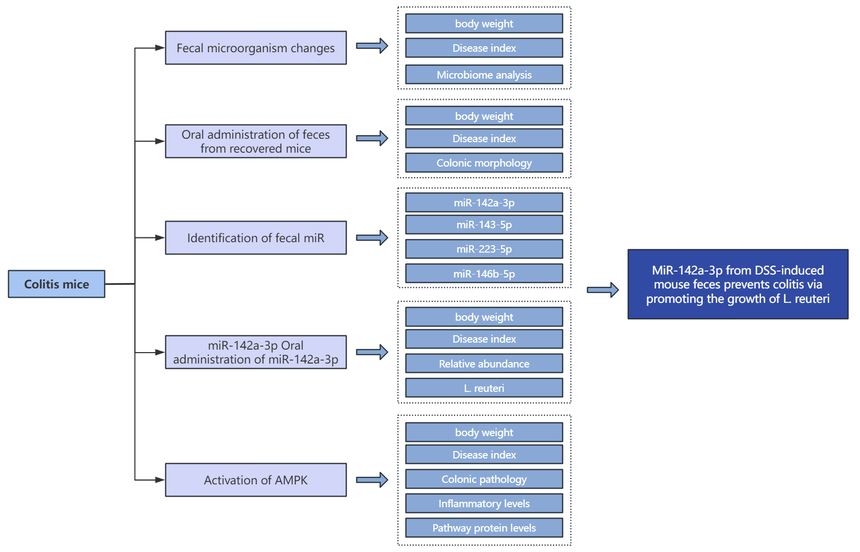Please click the button below to go to our email login page
|
Major breakthrough! IF of 12.1! Fengna Li’s team in the Institute of Subtropical Medicine of the Chinese Academy of Sciences has discovered effective substances for preventing colitis in mouse feces!As is well-known, the incidence of colitis is relatively high currently, resulting from multiple factors such as infection, drug reaction, food intolerance, autoimmune diseases, which thus negatively impacts the life of patients. Accordingly, researching effective methods to prevent colitis can benefit the people. Then, what are the design ideas for topics related to colitis? We can discuss it together with specific cases.
Next, we’re going to share a paper published in Molecular Therapy, with a high IF of 12.1, titled “Fecal miR-142a-3p from dextran sulfate sodium-challenge recovered mice prevents colitis by promoting the growth of Lactobacillus reuteri”, hoping to inspire you.
Research background
(1) Feces are enriched with microRNAs (miRNAs) that shape the gut microbiota. (2) These miRNAs are differentially expressed in the feces of healthy and diseased subjects. (3) Whether fecal miRNAs from patients with inflammatory bowel disease are implicated in regulating microbiota composition and whether they have any beneficial effects remain unknown. (4) This study explores the fecal microbiome composition and miRNA abundance in mice with dextran sulfate sodium (DSS)-induced colitis or at the recovery phase to unveil differently expressed miRNAs, their relations with microbial abundance, and their effects on colitis.
Technical route
Research results
(1) Changes in the fecal microbiome in the DSS-induced colitis and recovery phases (2) Oral transfer of feces from recovery mice and fecal RNA can prevent DSS-induced colitis (3) Identification of differently expressed fecal miRNAs in the DSS-induced colitis and recovery phases (4) Oral administration of miR-142a-3p in a microbiome-dependent manner can mitigate DSS-induced colitis (5) MiR-142a-3p attenuates DSS-induced colitis through promoting the growth of L. reuteri (6) L. reuteri alleviates DSS-induced colitis via activating AMPK pathway
Conclusion
The authors researched the composition of fecal microbiome and miRNA abundance in DSS-induced colitis mice and mice at the recovery phase, in order to explore difference miRNAs expressions, their relations with microorganism abundance, and their impacts on colitis. The results revealed that miR-142a-3p expression is elevated in colitis mice at the recovery phase, and mitigates mouse symptoms in a microorganism-dependent manner. Specifically, miR-142a-3p mediates transcripts of polA and locus tag LREU_RS03575 to boost growth of L.reuteri that displays high contents in feces of colitis mice. Besides, L.reuteri and its metabolic reuterin can relieve DSS-induced symptoms. These findings revealed the role of fecal miR-142a-3p in preventing colitis. It is concluded that feces from recovery subjects may be rich in miRNA possessing preventive effects. |

